A Glimpse Into the Life of a Slave Sold to Save Georgetown
(New York Times) He was an enslaved teenager on a Jesuit plantation in Maryland on the night that the stars fell. It was November 1833, and meteor showers set the sky ablaze.
His name was Frank Campbell. He would hold tight to that memory for decades, even when he was an old man living hundreds of miles away from his birthplace. In 1838, he was shipped to a sugar plantation in Louisiana with dozens of other slaves from Maryland. They had been sold by the nation’s most prominent Jesuit priests to raise money to help save the Jesuit college now known as Georgetown University.
Mr. Campbell would survive slavery and the Civil War. He would live to see freedom and the dawning of the 20th century. Like many of his contemporaries from Maryland, he would marry and have children and grandchildren. But in one respect, he was singular: His image has survived, offering us the first look at one of the 272 slaves sold to help keep Georgetown afloat. (read more)
This Colorado town shows off a forgotten piece of African-American history
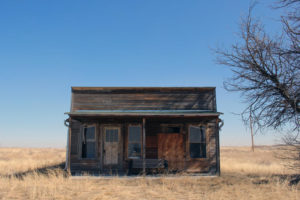
What is left of the home of O.T. Jackson, the founder of Dearfield, Colorado, sits on the town site in rural Weld County. Photo credit: Luke Runyon / Harvest Public Media
(kcur.org) Blink while driving on Highway 34 east of Greeley, Colorado, and you might miss the former Great Plains town of Dearfield.
Abandoned towns from the early 20th century are far from unique on this stretch of plains. Withered storefronts and collapsed false-front homes are common. Boom and bust economics and harsh weather made it tough for turn of the century settlers to succeed long-term.
Few ghost towns, however, have all the elements that make Dearfield’s story so compelling today: larger than life characters, struggles to live off the land, tales of racial integration at the height of the Jim Crow era.
Nearly a hundred years have passed since Dearfield’s streets were bustling with homesteaders. It is not the town’s layout or the structures here that make the place interesting, however. Instead, what makes Dearfield special is the people that lived here, says George Junne, professor of Africana Studies at the University of Northern Colorado, and the resident expert on Dearfield.
“It was the most successful, best known, African-American farming community in the United States at the time,” Junne says. (read more, listen to broadcast)
TIPHC Bookshelf
 Published scholarship on black history in Texas is growing and we’d like to share with you some suggested readings, both current and past, from some of the preeminent history scholars in Texas and beyond. We invite you to take a look at our bookshelf page — including a featured selection — and check back as the list grows. A different selection will be featured each week. We welcome suggestions and reviews. This week, we offer, “Stages of Struggle and Celebration, A Production History of Black Theatre in Texas” by Sandra Mayo and Elvin Holt.
Published scholarship on black history in Texas is growing and we’d like to share with you some suggested readings, both current and past, from some of the preeminent history scholars in Texas and beyond. We invite you to take a look at our bookshelf page — including a featured selection — and check back as the list grows. A different selection will be featured each week. We welcome suggestions and reviews. This week, we offer, “Stages of Struggle and Celebration, A Production History of Black Theatre in Texas” by Sandra Mayo and Elvin Holt.
From plantation performances to minstrel shows of the late nineteenth century, the roots of black theatre in Texas reflect the history of a state where black Texans have continually created powerful cultural emblems that defy the clichés of horses, cattle, and bravado. Drawing on troves of archival materials from numerous statewide sources, Stages of Struggle and Celebration captures the important legacies of the dramatic arts in a historical field that has paid most of its attention to black musicians.
Setting the stage, the authors retrace the path of the cakewalk and African-inspired dance as forerunners to formalized productions at theaters in the major metropolitan areas. From Houston’s Ensemble and Encore Theaters to the Jubilee in Fort Worth, gospel stage plays of the Black Academy of Arts and Letters in Dallas, as well as San Antonio’s Hornsby Entertainment Theater Company and Renaissance Guild, concluding with ProArts Collective in Austin, Stages of Struggle and Celebration features founding narratives, descriptions of key players and memorable productions, and enlightening discussions of community reception and the business challenges faced by each theatre. The role of drama departments in historically black colleges in training the companies’ founding members is also explored, as is the role the support of national figures such as Tyler Perry plays in ensuring viability. A canon of Texas playwrights completes the tour. The result is a diverse tribute to the artistic legacies that continue to inspire new generations of producers and audiences.
This Week In Texas Black History, Mar. 12-18
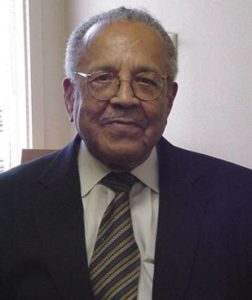 13 — Rev. Claude W. Black passed away on this day in 2009 after serving for 50 years as the pastor of Mt. Zion First Baptist Church in San Antonio, and as a civil rights leader. Black was also a four-term city councilman (1973-1978) and the city’s first black Mayor Pro Tem.
13 — Rev. Claude W. Black passed away on this day in 2009 after serving for 50 years as the pastor of Mt. Zion First Baptist Church in San Antonio, and as a civil rights leader. Black was also a four-term city councilman (1973-1978) and the city’s first black Mayor Pro Tem.
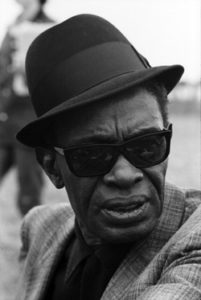 15 – Bluesman Sam “Lightnin” Hopkins was born on this day in 1912 in Centerville. At age eight he made his first instrument, a cigar-box guitar with chicken-wire strings. By ten he was playing music with his cousin, Texas Alexander, and Blind Lemon Jefferson, who encouraged him to continue. His 60-year career began in the 1920s and he recorded for almost 20 different record companies, played at Carnegie Hall with Pete Seger and Joan Baez and toured with the American Folk Blues Festival. Hopkins also played before Queen Elizabeth in a command performance. Some of his biggest hits included “Short Haired Women / Big Mama Jump!” (1947); “Shotgun Blues,” which went to Number 5 on the Billboard charts in 1950; and “Penitentiary Blues” (1959). Hopkins recorded a total of more than eighty-five albums.
15 – Bluesman Sam “Lightnin” Hopkins was born on this day in 1912 in Centerville. At age eight he made his first instrument, a cigar-box guitar with chicken-wire strings. By ten he was playing music with his cousin, Texas Alexander, and Blind Lemon Jefferson, who encouraged him to continue. His 60-year career began in the 1920s and he recorded for almost 20 different record companies, played at Carnegie Hall with Pete Seger and Joan Baez and toured with the American Folk Blues Festival. Hopkins also played before Queen Elizabeth in a command performance. Some of his biggest hits included “Short Haired Women / Big Mama Jump!” (1947); “Shotgun Blues,” which went to Number 5 on the Billboard charts in 1950; and “Penitentiary Blues” (1959). Hopkins recorded a total of more than eighty-five albums.
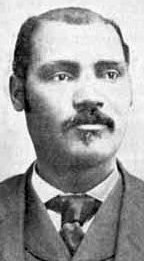 15 – Richard Henry Boyd was born on this date in 1843. Boyd was a preacher, missionary, entrepreneur, publisher, banker, educator, writer, and Black Nationalist who was born a slave in Noxubee County, Mississippi. Though his slave master christened him Dick Gray, he changed his name to Richard Henry Boyd after the Civil War. He served as a Texas Confederate body servant near the Battle of Chattanooga during the war. In 1869, Richard Boyd became a Baptist minister and in 1872 helped organize the Negro Baptist Convention of Texas. During the 1880s, he attended Bishop College strongly believing in the ideals of Black initiative and self-help for the former slaves.
15 – Richard Henry Boyd was born on this date in 1843. Boyd was a preacher, missionary, entrepreneur, publisher, banker, educator, writer, and Black Nationalist who was born a slave in Noxubee County, Mississippi. Though his slave master christened him Dick Gray, he changed his name to Richard Henry Boyd after the Civil War. He served as a Texas Confederate body servant near the Battle of Chattanooga during the war. In 1869, Richard Boyd became a Baptist minister and in 1872 helped organize the Negro Baptist Convention of Texas. During the 1880s, he attended Bishop College strongly believing in the ideals of Black initiative and self-help for the former slaves.
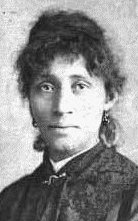 16 — Lucy Parsons, socialist and anarchist, was born this day in 1853 in Texas, though accounts differ as to her exact birthplace. Parsons had African American, Native American, and Mexican ancestry. She was a prominent feminist and early civil rights pioneer whose commitment to class struggle brought her to the front lines of the 1886 movement for the eight-hour workday. Parsons led mass hunger demonstrations of homeless and unemployed people in San Francisco and Chicago and was a powerful orator and activist. Considered a dangerous, explosive and robust threat to authorities, the Chicago police labeled Parsons “more dangerous than a thousand rioters.”
16 — Lucy Parsons, socialist and anarchist, was born this day in 1853 in Texas, though accounts differ as to her exact birthplace. Parsons had African American, Native American, and Mexican ancestry. She was a prominent feminist and early civil rights pioneer whose commitment to class struggle brought her to the front lines of the 1886 movement for the eight-hour workday. Parsons led mass hunger demonstrations of homeless and unemployed people in San Francisco and Chicago and was a powerful orator and activist. Considered a dangerous, explosive and robust threat to authorities, the Chicago police labeled Parsons “more dangerous than a thousand rioters.”
Blog: Ron Goodwin, author, PVAMU history professor
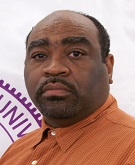 Ron Goodwin’s bi-weekly blog appears exclusively for TIPHC. Goodwin is a San Antonio native and Air Force veteran. Generally, his column addresses contemporary issues in the black community and how they relate to black history. He and the TIPHC staff welcome your comments.
Ron Goodwin’s bi-weekly blog appears exclusively for TIPHC. Goodwin is a San Antonio native and Air Force veteran. Generally, his column addresses contemporary issues in the black community and how they relate to black history. He and the TIPHC staff welcome your comments.
Read his latest entry, “Bearing His Cross,” here.
Submissions Wanted
Historians, scholars, students, lend us your…writings. Help us produce the most comprehensive documentation ever undertaken for the African American experience in Texas. We encourage you to contribute items about people, places, events, issues, politics/legislation, sports, entertainment, religion, etc., as general entries or essays. Our documentation is wide-ranging and diverse, and you may research and write about the subject of your interest or, to start, please consult our list of suggested biographical entries and see submission guidelines. However, all topics must be approved by TIPHC editors before beginning your research/writing.
We welcome your questions or comments via email or telephone – mdhurd@pvamu.edu.
